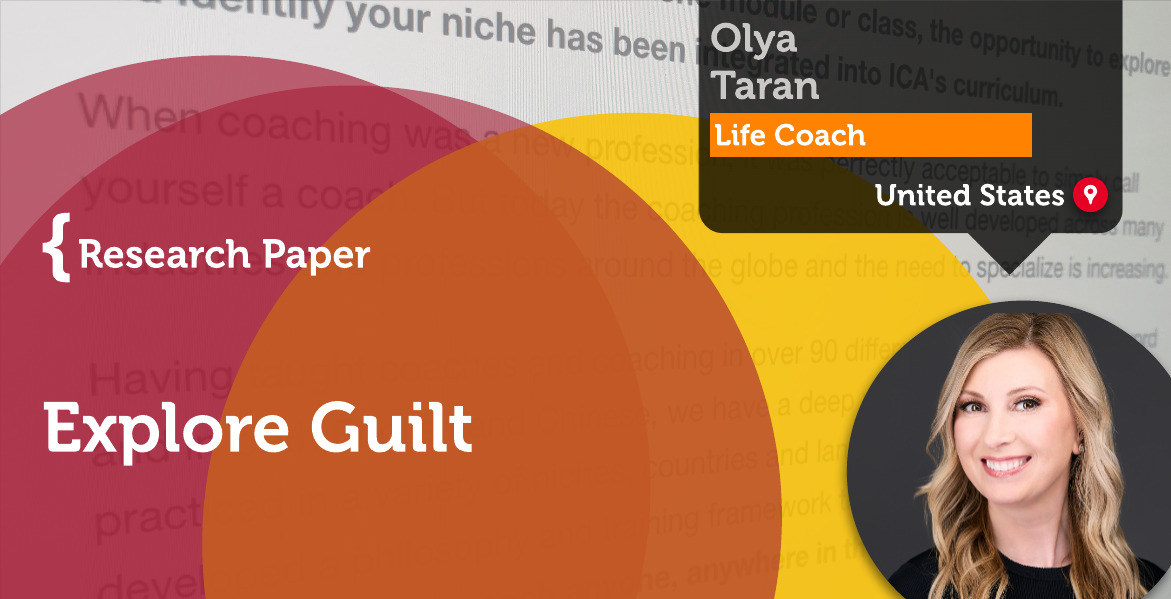A Research Paper By Olya Taran, Life Coach, UNITED STATES
Explore Guilt With the Goal of Releasing It
This article explores helping clients explore non-chronic guilt, including definition, the experience of guilt, related common beliefs, as well as coaching strategies that can be used to explore guilt. Gilt can be a helpful emotion, and serve as a symptom of behavior that might be harmful to others, or not aligned with a person’s values. In this case, acknowledgment and exploration of guilt with the goal of releasing it and creating productive action could be helpful. Occasionally, however, people have thoughts about their behavior that cause them to feel guilty in situations that don’t objectively warrant guilt. This article is based on common themes identified in coaching sessions with my clients, as well as external resources.
Guilt Context
In my coaching practice, I noticed that some of my clients experience guilt and intuitively wonder whether guilt is objectively warranted or not. Clients also realize that once acknowledged, guilt is not helpful anymore and can be released to unblock forward movement. Clients share that guilt feels uncomfortable, sometimes unnecessary, blocks them from moving forward, and is difficult to overcome on their own because they need a shift in perspective. I decided to get a deeper understanding of what guilt is and related common beliefs, so I could identify potential areas/angles to explore with clients.
I also noticed that some of my clients have episodic guilt experiences, while others have inappropriate or chronic guilt. Inappropriate or excessive guilt is listed as a symptom of depression by the American Psychiatric Association (1994) [2]. It is important to consider referring clients with inappropriate or excessive guilt to a mental health professional.
What’s guilt? From a cognitive point of view, guilt is an emotion that people experience because they’re convinced they’ve caused harm. In cognitive theory, thoughts cause emotions. The emotion of guilt follows directly from the thought that you are responsible for someone else’s misfortune, whether or not this is the case [1].
In situations when the client truly offended or wronged somebody, the remedy is to repair the relationship with others and with ourselves. This starts with validating the other person’s feelings and showing empathy. At this point, the relationship boundaries can be re-negotiated. Self-forgiving is also important to alleviate guilt [4].
According to the cognitive perspective, people who experience unnecessary guilt, are mistakenly under the illusion that they have caused other people harm. Their negative emotion follows from a misinterpretation of what happens to them, and from not questioning the logic of their conclusions.
Such mental processes as catastrophizing (making the very worst of a bad situation) or overgeneralizing (believing that if one bad thing happened, many more must have as well) have also been linked to the experience of unnecessary guilt. Because of our natural tendency toward egocentrism, we assume that others place far more importance on our thoughts and actions than they actually do. The behavior over which you are tormented by guilt, such as inadvertently insulting a friend, may have had less of a negative impact than you think.
Another interesting related concept is the conscious vs automatic self and its role in guilt. Sometimes, guilt is connected to the automatic self-being in control, and the conscious self not considering the consequences. [3] Changing automatic habits from negative to positive can help avoid situations that may create guilt. Sometimes the conscious self knows the action is bad, but the automatic self does it anyway. Mindfulness and developing self-control can be helpful here.
Sometimes guilt doesn’t arise naturally, but is rather suggested by other people and is used in an attempt to manipulate and cross normal boundaries, i.e., “guilt trip”.People who have a need for external validation, difficulty with confrontation, low self-esteem, and a desire to save others might be more susceptible to these situations. [5]
Emotion of Guilt
If the emotion of guilt is caused by the client’s thoughts about their action/behavior, then the following model could be used to help shift the mindset.
|
From |
Through |
To |
|
Illusion |
Test reality
|
Truth |
|
Assume |
Validate
|
Repair |
|
Catastrophizing |
Perspective
|
Awareness, adopting a reasonable perspective |
|
Generalizing |
Perspective
|
Rational thinking |
|
Violating standard(s) |
Check standards
|
Respecting standards |
|
Guilt spectrum |
Check spectrum
|
Healthy vs. un-healthy |
|
Others use guilt (i.e., “guilt trip”) |
External vs. internal focus
|
Self-efficacy |
Exploration of Guilt
Some amount of guilt is healthy and helpful in personal growth and regulating behavior. Exploration of guilt is a common theme in my coaching practice. Related concepts include making assumptions, the illusion of having caused harm; catastrophizing; generalizing; the belief that standards have been violated. There is a healthy and unhealthy experiences of guilt, with unhealthy guilt being a symptom of depression, and one may benefit from assistance from a mental health professional. Areas for exploration of guilt were suggested.
References
https://www.psychologytoday.com/us/blog/fulfillment-any-age/201208/the-definitive-guide-guilt
Tilghman-Osborne, C., Cole, D. A., & Felton, J. W. (2012). Inappropriate and excessive guilt: instrument validation and developmental differences in relation to depression. Journal of abnormal child psychology, 40(4), 607–620.
Rewire Your Brain: Change Your Approach to Life. A Bold Recovery Guide to Save Your Anxious Mind from Addiction. The Power of the Affirmations That Will Change Your Bad Habits. Jacob King, Oct 2019
Emotional First Aid: Healing Rejection, Guilt, Failure, and Other Everyday Hurts. Guy Winch Ph.D., Jul 29, 2014
Emotional Blackmail: When the People in Your Life Use Fear, Obligation, and Guilt to Manipulate You. Susan Forward and Donna Frazier, Jul 30, 2019
